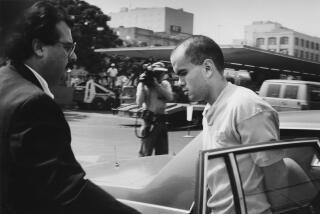Victim’s Taped Final Words Played for Jury
SANTA ANA — The agonizing final moments of Karen Marie LaBorde filled a courtroom Monday when a prosecutor played a tape recording of the woman made at the hospital and then urged a jury to recommend a death sentence for the man who doused her with gasoline, then ignited her with a cigarette lighter.
“Can you think of a more painful and cruel way to kill a person than to light them on fire?” Deputy Dist. Atty. Robert Molko asked jurors, who stared ahead grimly as the tape was played.
Jonathan Daniel D’Arcy, a 34-year-old janitor from Buena Park, was convicted last month of first-degree murder in the 1993 burning death of LaBorde, a 42-year-old mother of two who identified D’Arcy as her assailant before she died. The verdict included findings of torture and mayhem, which make him eligible for the death penalty.
“How incredible, unbelievable and indescribable must the pain be for a mother to say, ‘I want to die,’ ” Molko said during his closing remarks in the penalty phase of the murder trial.
The jury will begin deliberating on D’Arcy’s fate today.
Defense attorney George Peters acknowledged to jurors the heinous nature of the crime, but asked the panel to spare his client’s life. He cited numerous examples in history where criminals were spared from execution because of mental illness.
Peters described D’Arcy as “not of our world totally” and said that D’Arcy’s crime was the product of a very disturbed mind brought upon by an abusive upbringing.
“I think the evidence is strong and noncontradictory that Mr. D’Arcy is mentally ill and has been through most of his life,” Peters said. “He can’t reach our radio frequency. He’s a stranger in a strange land. That’s why people like Mr. D’Arcy don’t have the same level of responsibility.”
But Molko argued that D’Arcy’s state of mind was the result of 17 years of drug abuse and that D’Arcy was fully aware of what he was doing when he killed LaBorde on Feb. 2, 1993, in a dispute over a paycheck he thought was being withheld from him. LaBorde worked for a Tustin building maintenance company that had employed D’Arcy. She suffered burns over most of her body and died several hours later.
“This was an intentional, purposeful, calculated, horrible and atrocious killing,” the prosecutor said. “He planned what he was going to do. He knew what he was going to do and he went ahead and executed his plan. He was the one who chose Karen LaBorde’s destiny and he is the one who chose his own destiny.”
Monday’s closing remarks wrapped up what has been a most unusual murder trial which included not only the victim’s dying words on tape, but a hunger-striking defendant who boycotted his own trial, appearing only once before jurors to read poetry and share personal stories.
D’Arcy continued his boycott on Monday, despite being urged strongly by Superior Court Judge Robert R. Fitzgerald to remain in the courtroom during closing arguments. Fitzgerald told D’Arcy that his absence “may be looked at adversely by the jurors.”
But D’Arcy, who appeared briefly in court outside the presence of the jurors, told the judge he was leading a “full protest” and said he did not want to be in the courtroom or even listen to the proceedings from an adjoining room.
D’Arcy is protesting his lawyer’s handling of the case and staged a hunger strike, at one point losing 20 pounds. As the month-long trial unfolded in one courtroom, a judge in another courtroom ordered that D’Arcy be fed with a tube as needed at a jail medical facility.
More to Read
Sign up for Essential California
The most important California stories and recommendations in your inbox every morning.
You may occasionally receive promotional content from the Los Angeles Times.









